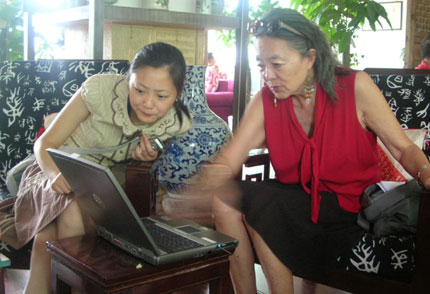The plum blossom of Chengdu
By Huang Zhiling (chinadaily.com.cn)Updated: 2007-06-22 13:18
 Tang Yungmei (R) with He Jie, one of her friends in Chengdu. [Huang Zhiling/chinadaily.com.cn] |
Tangis from New York. She has just finished teaching English for the spring term to a group of 24 rural female English teachers from different areas of Sichuan including two from neighboring Yunnan Province.
Tang, a noted educator who graduated from Columbia University in New York with several degrees in education and education-related fields, was invited by Qing Guangya, headmaster of Guangya School, last October to teach the rural women English teachers.
Tang arrived in Chengdu in early March to start teaching the four-month program. "It was really challenging and energizing, but meaningful," explains Tang. "The teachers will be teaching more rural primary school kids with what they have learned from the program."
Tang, who has worked as a teacher for more than 20 years in New York City, in private and public schools as well as in Xi'an and Chengdu, has been deeply influenced by her mother Han Suyin, a world-renowned author.
Han, whose father was a native of Pixian, a county in Chengdu, enjoys international fame. One of her most famous works is the autobiographical novel, "A Many Splendored Thing."
Written in 1950, the story recounts Han, a Eurasian doctor, and her relationship with foreign correspondent Mark Elliott. The book was adapted into a film in 1955 by 20th Century Fox in the United States and won 3 Academy Awards for Best Costume, Best Song and Best Score the following year.
Han's daughter Tang was born in Chengdu. At the age of two, she left for England with her mother who was studying medicine in London, and did not return to her birthplace until 1972.
When she was 8, her mother took Tang to Hong Kong where she attended school and learned Cantonese. Five years later, they moved to Malaysia where she graduated from high school and learned Mandarin with a private Chinese tutor after regular school hours.
She was puzzled why she had to learn Mandarin, for her mother spoke English with her and nobody around her spoke Mandarin, a language which proved to be very difficult to learn.
"My mother said I had to learn the language because I'm Chinese," recalled Tang.
"When I taught English at Xihua University in Chengdu for half a year in 2004, I told my mother, 'Your investment finally paid off, 54 years later,' as I spoke Chinese very often for the first time," she said with a laugh.
When she was 28, after a short marriage and bringing up her only daughter, Tang studied at Columbia University for 10 years of part-time studies, obtaining a BA, an MA and an EdM.
Han, now 90, lives in Lausanne, Switzerland, and has not visited China since 1998.
"My mother was very happy when she learned I chose education as my career. She wrote to me that education was significant to both others and me, hoping one day I could return to Chengdu as a teacher. My mother said that it was admirable that her daughter hoped to work as a teacher to help rural kids," Tang said.
Tang, who teaches her students all aspects of English at Guangya School, dismisses rote learning and discourages them from using the dictionary when trying to understand new words.
"I encourage them to first try to guess the meaning from the context and only look at a Chinese dictionary to check if they are correct," she said.
Tang also encourages her students to speak only English in class.
In addition to classroom teaching, Tang makes use of every opportunity to broaden her students' horizons, many of whom are not English majors.
In April, she invited her friend Ma Xuefeng, headmaster of Chengdu Bright Future English School, to give a lecture on how to teach English to Chinese students.
A graduate of the Foreign Languages College of Sichuan Normal University, Ma set up the school in 2004. It has become one of Sichuan's best English-teaching schools and over 1,000 students have graduated ever since.
Tang also arranged two occasions for her Guangya students to meet with a group of American tourists who had a 2-day stopover in Chengdu during their 3-week tour of China.
The 24 female teaching students were extremely excited, and a little nervous at the initial meeting, because it was the very first time in their lives to speak English with a native speaker in a casual social setting.
"That experience gave them a strong boost of confidence. They discovered they could do it," Tang said.
Tang, whose given name Yungmei means "plum blossom of Chengdu" in Chinese, was born on the third day in the first month of the lunar Chinese calendar when plum blossoms are prevalent in the city.
Her name, which was chosen by her father, shows her parents' love for Chengdu.
Tang shows an intense interest in the culture and folk customs of Chengdu where she has met several painters and visited many museums.
One of her favorite places is the Jinsha Site Museum, which displays gold, jade and stone wares excavated from the Jinsha Ruins.
Archaeologists hail the Jinsha Ruins, which date back 3,000 years, as one of Sichuan's most important archaeological finds.
Tang has been active in promoting exchanges of visits by American and Chinese students since 1979 when the United States and China resumed diplomatic relations.
She has organized students from the United States to visit China and vice versa, furthering a better understanding between young people of both countries.
In light of the world's acceleration towards globalization, Tang firmly believes in the increasing necessity for young people of different nations and cultures to widen their perspectives.
"It is only through mutual interaction and profound understanding that all people in this world can hope to achieve any sense of peace and harmony," she said.
|
||
|
||
|
|